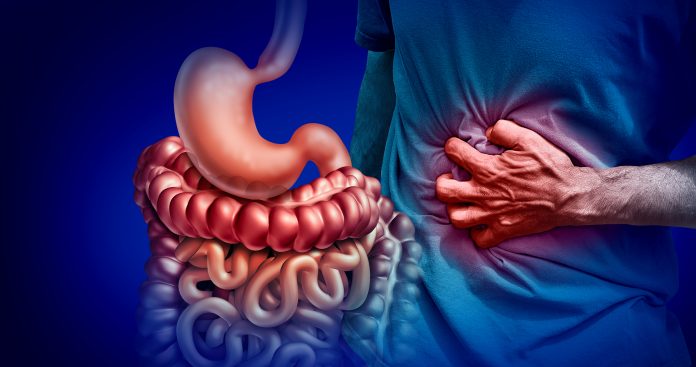
A team of researchers led by the Berlin Institute for Medical Systems Biology of the Max Delbrück Center (MDC-BIMSB) and Charité – Universitätsmedizin, have shed new light on the role of the p53 tumor suppressor gene in the pathogenesis of ulcerative colitis (UC). The collective findings from the researchers’ studies using 3D organoids, and in vivo experiments in mouse models, could lead to earlier diagnosis, and point to a potential drug target for stopping the disease from progressing.
The study was published in the journal Science Advances and headed by a team in the lab of Michael Sigal, MD.
“In patients with ulcerative colitis who are at high risk for developing cancer, we could potentially target aberrant cells and get rid of them early, before any cancer occurs,” said Sigal, group leader of the Gastrointestinal Barrier, Regeneration Carcinogenesis lab at MDC-BIMSB, Head of Luminal Gastroenterology at Charité.
Existing tests, such as colonoscopies, to find precancerous lesions in patients with UC can identify visible lesions that sometimes are not easy to remove, said Sigal. The new study results could be a first step towards the development of molecular tools for a less invasive diagnostic test that would allow physicians to identify the aberrant cells much earlier, even before visible alterations occurred.
Ulcerative colitis primarily affects large intestine, specifically areas called “crypts,” tube-like glands within the epithelial tissue that lines the intestine. Crypts contain stem cells and other cell types that maintain the health and normal function of the colon, such as absorbing nutrients or secreting mucus. “The colonic epithelium is organized into clonal crypts, which, under homeostatic conditions, show a distinct cellular organization with proliferative Lgr5+ stem cells in the crypt base giving rise to short-lived differentiated secretory and absorptive lineages,” the authors explained.
When the colon is injured, epithelial crypt cells enter a “repair mode.” They begin to proliferate rapidly to fix the injury. “Mucosal injury causes transient reprogramming of the epithelium into a highly regenerative state, characterized by an expansion of proliferative cells at the expense of differentiation—a state that resembles the fetal epithelium,” the team continued.
However, in patients with UC and UC-related colon cancers these cells become stuck in repair mode, which scientists refer to as a regenerative cell state. As a result, there are too few mature cells. Consequently, the colon struggles to function normally, which triggers even more stem cell proliferation in a toxic feedback loop. “The epithelium of patients with UC shows chronic up-regulation of regenerative fetal-like gene signatures, suggesting that it persists in the regenerative state long-term.”
Patients with UC have a higher risk of developing colorectal cancer (CRC), and cells that lack p53 signaling frequently occur in ulcerative colitis (UC) and are considered early drivers in UC-associated colorectal cancer (CRC), the authors further commented. “… loss or inactivation of p53 is frequently observed in UC-associated CRC.” In their newly reported study, Kimberly Hartl, graduate student at the Berlin Institute for Medical Systems Biology of the Max Delbrück Center (MDC-BIMSB) and Charité – Universitätsmedizin, and colleagues found that the defective repair mechanism in UC is linked to a non-functional p53 gene, which plays a key role in regulating the cell cycle and in repairing DNA. “If there is no p53, cells remain in a proliferative state,” Sigal explained.
To study the repair process the researchers developed a three-dimensional organoid—a mini organ—model of the colon grown from mouse stem cells. Together with specialists in DNA and RNA sequencing as well as proteomics and metabolomic technology at the Max Delbrück Center, they found that cells in organoids lacking p53 are stuck in the regenerative state. “By integrating comprehensive proteome and transcriptome analyses, we discover that epithelium lacking p53 fails to reestablish homeostatic crypt architecture and lineage diversity and instead remains locked in a fetal-like regenerative state,” they wrote. Thus, the cells metabolize glucose more rapidly via the process of glycolysis. By contrast, when p53 is active, it diminishes glucose metabolism and signals cells to re-enter a healthy state. “… we show that colon cells gain increased glycolytic capacity when they enter the regenerative state, which is down-regulated again once they return to homeostasis,” the scientists stated. “This likely enables cells to meet their increased energy needs during the proliferative burst after injury while later reestablishing a slower cell turnover during homeostasis by reducing glycolytic capacity again.”
The investigators then treated the organoids with compounds that interfere with glycolysis to test whether they can target these highly proliferative cells. They found that cells that lacked the p53 gene were more vulnerable to this treatment than normal cells. “With organoids, we can identify very specific agents that can target metabolic pathways and point us toward potentially new therapeutics to selectively target mutated cells,” Hartl added.
The authors concluded, “In this study, we provide evidence for a critical role of p53 signaling in terminating regeneration after acute colitis … Our data provide a mechanistic explanation of why early loss of p53 signaling is frequently observed in UC-associated colorectal carcinogenesis.”
Looking toward the future, the researchers hope to transfer these findings to the human setting. They are also now studying the repair process in more detail with the goal of developing more simple methods to identify cells with defective p53 genes in colon tissue. “Once we have a simple method of identifying these individual cells in colon tissues, we could perform clinical studies to selectively kill them, and then analyze whether this is associated with a lower risk of developing cancer,” said Sigal.





